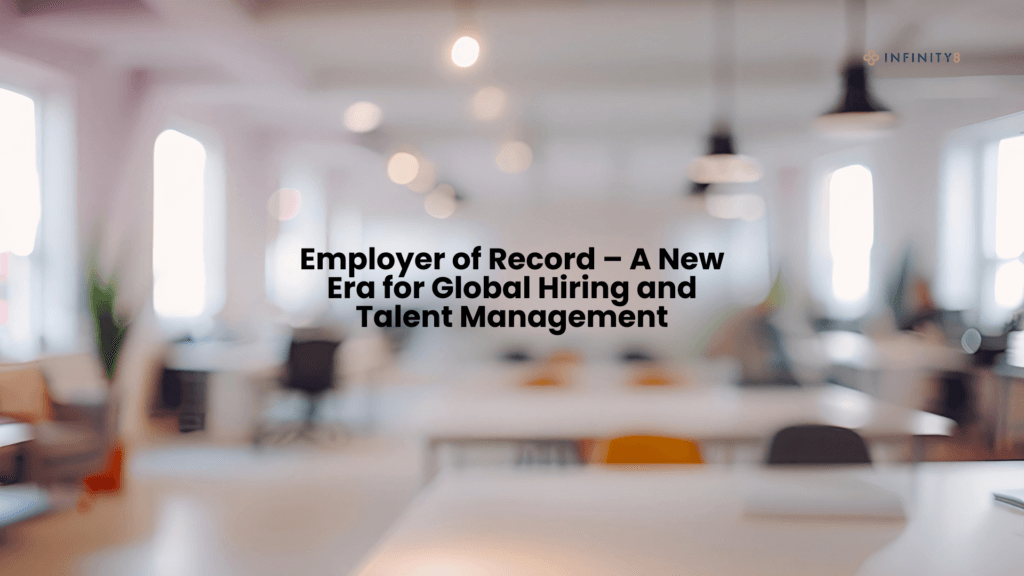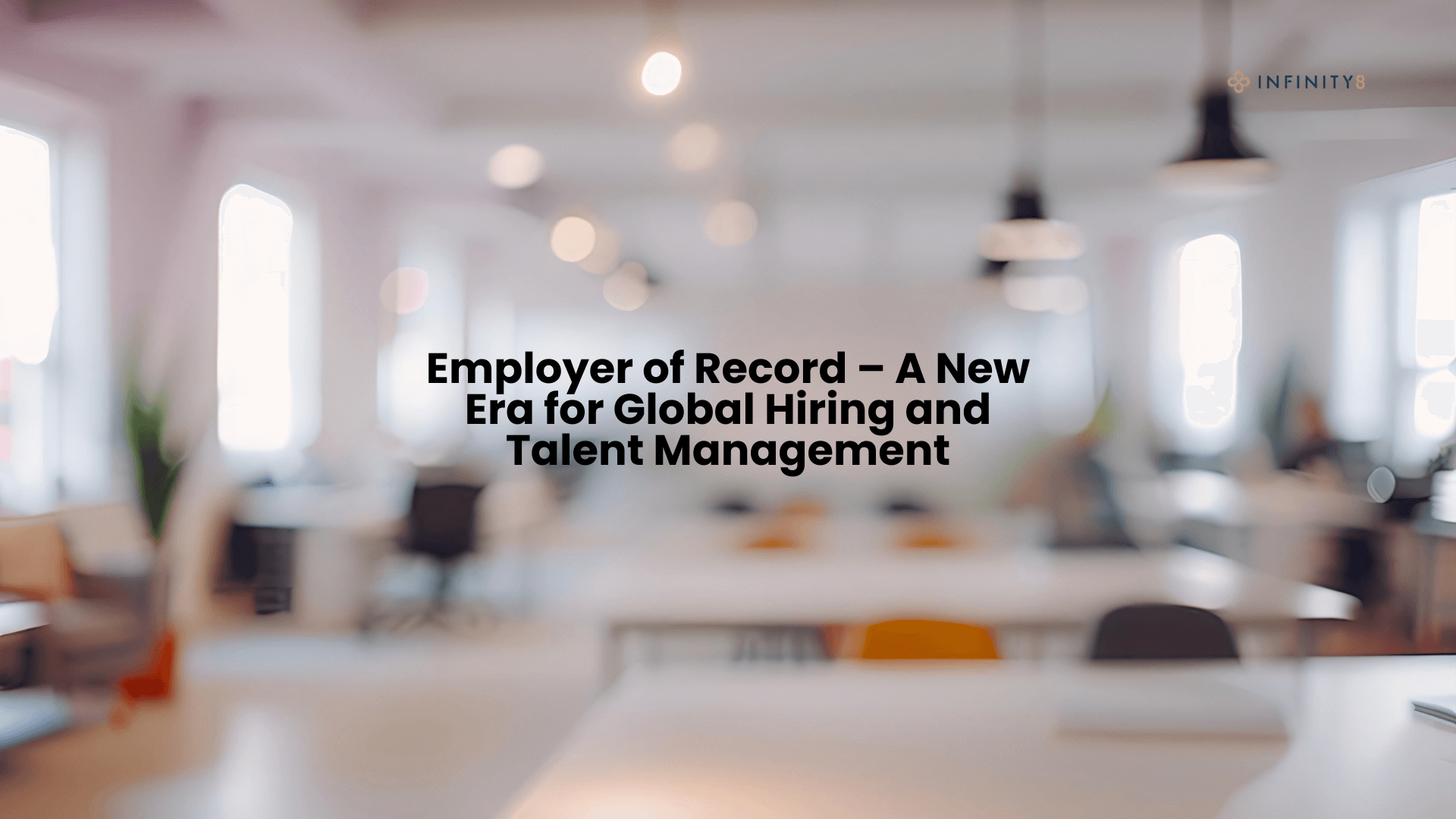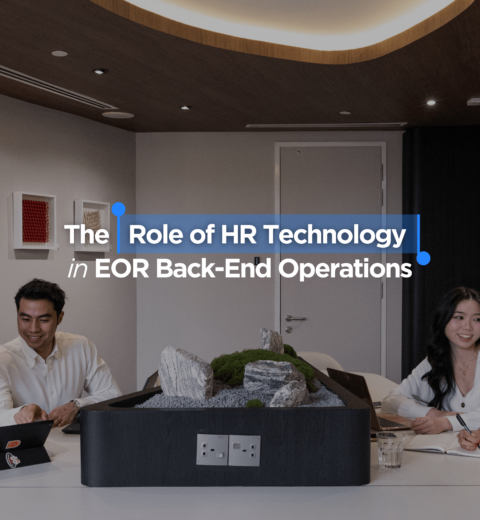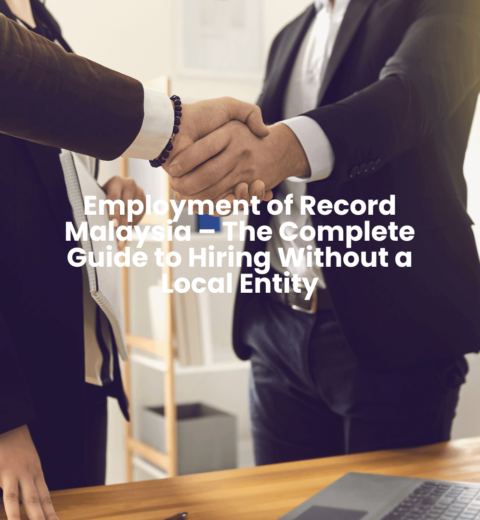
Your HR officer is scrambling through old folders, searching for a signed contract from six months ago. An employee is disputing their final pay, but the document can’t be found, only a vague email and a missing PDF. A small oversight, yet one that shows how easily HR compliance can slip through the cracks.
Payroll insists it’s HR’s responsibility, while HR points to Finance. The employee mentions filing a complaint with JTKSM, and suddenly, what should have been a routine admin task escalates into a potential legal issue. In many Malaysian companies, this kind of misalignment is more common than most realize.
This is why HR compliance is critical. It’s more than ticking boxes, it safeguards your business. But in today’s new era of global hiring, compliance has become more complex than ever. Companies are no longer only managing local employees; they’re hiring across borders, onboarding remote teams, and meeting the expectations of a Gen Z and Gen Alpha workforce that values flexibility and fairness.
That’s where Employer of Record (EOR) solutions come in, bridging compliance with opportunity.
What is HR Compliance?
HR compliance refers to aligning a company’s workplace policies with labor laws at the local, national, and international levels, as well as with any industry-specific regulations. It also ensures that these rules are applied consistently in day-to-day operations, making compliance a core responsibility of the HR department.
It covers areas such as recruitment, workplace conduct, employee rights, and company procedures. Beyond legal requirements, many organizations also establish internal compliance guidelines to maintain high standards across the business.
Because labor laws frequently change and enforcement is becoming stricter, businesses must develop clear policies to support fair and legal HR practices. Compliance is not optional, it’s essential to protect both employees and the organization.
To avoid legal and financial risks, businesses should:
- Understand and comply with employment laws, including regulations on working hours, wages, benefits (EPF, SOCSO), and employee termination.
- Be prepared for inspections by government agencies such as JTKSM or PERKESO to prevent fines and operational disruptions.
- Recognize that ignorance of the law is not an excuse, employers are expected to stay informed.
- Acknowledge that HR violations can lead to costly lawsuits, reputational damage, or even threaten business continuity.
In short, HR compliance is about building a workplace that is not only lawful but also ethical and sustainable for long-term success.
Areas of HR Compliance
Managing HR compliance in Malaysia can quickly become complex, as it involves multiple layers of legal and operational requirements. Businesses must understand and adhere to various obligations, including the following:
- Statutory Compliance
Statutory compliance refers to adherence to employment laws mandated by the Malaysian government. These include:- Employment Act 1955 (Amended 2022): Governs working hours, overtime pay, employee rights, termination procedures, and sick or annual leave.
- Minimum Wages Order 2024: Establishes the national minimum wage, which varies based on region and sector.
- EPF, SOCSO, and EIS contributions: Employers are required to register employees and contribute to the Employees Provident Fund (EPF), Social Security Organisation (SOCSO), and Employment Insurance System (EIS).
- Occupational Safety and Health Act 1994 (OSHA): Obligates employers to provide and maintain a safe working environment.
These statutory obligations apply to both local and foreign employees, including contract workers and those in the gig economy, depending on company size and structure.
- Regulatory Compliance
Regulatory compliance focuses on rules and guidelines issued by government agencies and authorities, such as- Inland Revenue Board (LHDN): Regulates income tax deductions (PCB), employer reporting, and compliance with tax-related employment matters.
- Department of Labour (JTKSM): Conducts inspections and enforces fair labor practices.
- Department of Occupational Safety and Health (DOSH): Oversees workplace safety standards and reporting.
Failure to comply with these regulations can result in penalties, blacklisting, or legal action.
- Contractual Compliance
Contractual compliance relates to obligations set out in contracts or agreements that the company enters into, including:- Employment Contracts: Must clearly state terms of wages, working hours, job scope, probation, benefits, and termination, aligned with the Employment Act.
- Third-Party Contracts: For outsourced services or independent contractors, compliance includes fulfilling payment terms, safeguarding data privacy, and upholding non-discriminatory clauses.
- Union or Collective Agreements (CBA): Where employees are unionized, companies must adhere to CBA terms covering salaries, leave entitlements, workplace conduct, and dispute resolution. In Malaysia, CBAs are regulated under the Industrial Relations Act 1967.
Why is HR Compliance Important?
Managing compliance can be challenging, especially when employees work remotely or across multiple sites. Monitoring working hours, overtime claims, and health and safety standards becomes more complex in such settings.
In Malaysia, employment laws apply nationally, and companies remain accountable for providing fair and safe working conditions, regardless of where employees are based.
This is why a clear, regularly updated HR compliance framework is essential. It minimizes the risk of costly penalties, safeguards your company’s reputation, and ensures smoother HR operations as your business grows. In short: non-compliance isn’t just a legal risk, it’s a business risk.
The New Era of Hiring: Why Employer Of Record Matters
In the past, expanding into a new market like Malaysia required setting up a legal entity, registering with local authorities, and building HR systems from scratch. This process could take months and cost thousands of ringgit.
Today, businesses move faster. They need to:
- Test new markets without heavy upfront investment.
- Access Malaysian talent in areas like tech, manufacturing, and finance.
- Hire remote workers while staying compliant with EPF, SOCSO, EIS, and LHDN requirements.
- Adapt to Gen Z and Alpha employees who expect seamless onboarding, timely payroll, and flexible benefits.
An Employer of Record (EOR) makes this possible by acting as the legal employer on behalf of your company. You retain full control of the employee’s day-to-day work, while the EOR manages contracts, payroll, statutory contributions, and compliance with Malaysian labor laws.
Examples of HR Compliance Issues in Malaysia
HR plays a crucial role in ensuring compliance, yet there are several areas where businesses frequently face challenges:
- Adapting to Malaysia’s Changing Labor Laws
The Employment Act 1955 (Amendment 2022) remains the backbone of Malaysia’s labor regulations. Depending on the nature of employment and industry, companies must also comply with the Industrial Relations Act, OSHA 1994, as well as requirements from JTKSM, SOCSO, and EPF.
These laws regulate core employment matters such as minimum wages, working hours, rest days, probation, maternity leave, and overtime.
Misinterpretation or inconsistent application, particularly for organizations managing diverse workforces across regions, can expose employers to disputes, financial penalties, or legal action.
- Employee Misclassification
A common compliance issue is the misclassification of employees, for instance labeling full-time staff as independent contractors to reduce statutory obligations. Under SOCSO and EIS regulations, employers must register eligible employees and make mandatory contributions to SOCSO, EPF, and EIS.
Improper classification can result in:- Backdated statutory contributions (SOCSO, EPF, EIS)
- Penalties for late or non-registration
- Potential lawsuits or claims from affected employees
HR plays a crucial role in ensuring compliance, yet there are several areas where businesses frequently face challenges:
- Adapting to Malaysia’s Changing Labor Laws
The Employment Act 1955 (Amendment 2022) remains the backbone of Malaysia’s labor regulations. Depending on the nature of employment and industry, companies must also comply with the Industrial Relations Act, OSHA 1994, as well as requirements from JTKSM, SOCSO, and EPF.
These laws regulate core employment matters such as minimum wages, working hours, rest days, probation, maternity leave, and overtime.
Misinterpretation or inconsistent application, particularly for organizations managing diverse workforces across regions, can expose employers to disputes, financial penalties, or legal action.
- Employee Misclassification
A common compliance issue is the misclassification of employees, for instance labeling full-time staff as independent contractors to reduce statutory obligations. Under SOCSO and EIS regulations, employers must register eligible employees and make mandatory contributions to SOCSO, EPF, and EIS.
Improper classification can result in:- Backdated statutory contributions (SOCSO, EPF, EIS)
- Penalties for late or non-registration
- Potential lawsuits or claims from affected employees
With the rise of the gig economy, authorities are paying closer attention to employment status, making it essential for businesses to properly define job roles and contracts.
- Data Privacy & Payroll Compliance
Malaysia’s Personal Data Protection Act (PDPA) 2010 sets strict rules on how employers collect, store, and process employee data, especially in recruitment, payroll, and performance management. Key risks include:- Collecting unnecessary personal data
- Processing data without employee consent
- Transferring data abroad without proper safeguards
Non-compliance can result in fines of up to RM500,000 and even imprisonment, depending on severity. Payroll mistakes, such as late salary payments or incorrect deductions, can also lead to complaints to JTKSM and reputational harm. As digital HR solutions become more common, ensuring that systems are PDPA-compliant and audit-ready is no longer optional, it’s a necessity.
Malaysian & Regional Case Studies: How Employer Of Record Works in Practice
EOR isn’t just theory, it’s already helping businesses expand, stay compliant, and scale faster in Malaysia and across the region. Below are some real-world examples of how different companies leveraged Employer Of Record solutions:
| Case | What Happened | Relevant Details / Metrics | How It Helps as a Malaysian-Case Example |
| SecondTalent − Retail & Back-Office Workforce Expansion (Singapore & Malaysia) | A fast-growing lifestyle retail brand headquartered in Singapore expanded into Malaysia without setting up its own entity there. They needed both store staff (front-office) and back-office roles (marketing, e-commerce, etc.). (Reference: Second Talent) | Back-office staff hired flexibly (hybrid, remote) in Malaysia via EOR / payroll placement. The company avoided building its own legal / HR infrastructure in Malaysia. Compliance with contracts, payroll, and statutory contributions was handled locally by SecondTalent. | Good proof that Employer of Record works for mix of roles (in-store + remote / hybrid), across border, with statutory compliance. Can be used to show how fast / low risk expansion can be done. |
| SecondTalent − Cybersecurity Firm Scaling Across SEA | Singapore-based cybersecurity company wanted to hire in several SEA markets (including Malaysia), had short timelines, and needed to remain compliant without setting up local entities everywhere. (Reference: Second Talent) | They filled roles like software engineers, QA, support across Malaysia & Indonesia etc. They shifted focus mid-process to include Malaysia because of business changes. They used EOR to place employees under local legal entities managed by the EOR provider. | This shows flexibility + agility of Employer of Record. Works well as example when business needs evolve. |
| Australian Accounting Firm – Remote Team in Malaysia | An Australian accounting firm engaged an “offshore remote team” in Malaysia via Employer of Record (through FastLaneRecruit) instead of establishing a local entity. (Reference: Fastlane Recruit | The firm could hire folks in Malaysia, have legally compliant contracts, EPF/SOCSO/EIS, handling onboarding, payroll, leave, etc. by the Employer of Record provider. They focused on control of day-to-day work while delegating local statutory compliance. | Useful “foreign company entering Malaysia” story. Shows how professional services sector (accounting) used EOR. |
| Mindvalley & Multiplier | Mindvalley, based in Kuala Lumpur, used EOR to hire globally (cross-border) outside Malaysia, to scale international talent. (Reference: Multiplier) | They onboarded 18 employees across Europe & Asia. The EOR provider helped with contract generation, infrastructure, compliance etc. Focus was global hiring rather than Malaysia-entrance, but demonstrates how EOR infrastructure works well from a Malaysian HQ. | Good example of a local (Malaysian) company using Employer of Record to manage compliance globally. Useful contrast / endorsement. |
Employer of Record in Malaysia’s Oil & Gas Sector
The oil & gas industry in Malaysia is one of the most tightly regulated sectors, with strict requirements set by PETRONAS. Companies that wish to operate or supply manpower in this field must be licensed and registered under the PETRONAS Licensing & Registration (PLR) system. In addition, there are strong local content rules, meaning priority is given to Malaysian talent, while expatriate hiring requires special approvals and justification. These restrictions make it challenging for foreign companies to place staff or contractors directly in Malaysia.
This is where an Employer of Record (EOR) becomes a strategic solution. By acting as the legal employer, an EOR ensures full compliance with Malaysian labor laws, taxation (EPF, SOCSO, EIS), and PETRONAS regulations. For oil & gas projects, an Employer of Record can manage expatriate work permits, handle payroll for local staff, and navigate sector-specific rules that would otherwise slow down project timelines.
HR Compliance Measures Companies Should Know
Managing HR is more than just handling people, it’s about ensuring your company complies with labor laws and regulations. HR compliance covers areas such as hiring and termination, payroll, statutory contributions, employee safety, and welfare. Here are some key HR compliance tasks every employer in Malaysia should stay on top of:
- Display Mandatory Labour Law Notices
Employers are required to display important notices, such as the Employment Act, Minimum Wage Order, and workplace safety regulations, in locations accessible to employees. These notices must be updated whenever the law changes. - Properly Classify Your Workers
It’s crucial to determine whether a worker is an employee or an independent contractor. Employees are subject to EPF, SOCSO, and EIS contributions, while contractors are not. Misclassification, even if unintentional, can result in back payments, fines, and penalties. - Maintain and Update Your Employee Handbook
Although not legally required, an employee handbook is a valuable tool for setting out workplace rules and expectations. It should be updated regularly to reflect changes in labor laws and company policies, reducing the risk of disputes or misunderstandings. - Provide Onboarding and Exit Documents
During onboarding, employees should receive offer letters, job descriptions, and documents explaining statutory benefits. At resignation or termination, employers must issue final payslips, termination letters, and EA forms (for tax reporting) promptly. - Comply with Final Salary Payment Rules
Under the Employment Act, employees must be paid their final salary on their last working day or within seven days of termination. Delays can lead to complaints being filed with the Labour Department (JTKSM).
Staying compliant with HR regulations not only helps avoid penalties but also builds trust and fairness in your workplace.
Conclusion
HR compliance means following Malaysian labor laws and applying them consistently across all HR operations. It helps businesses avoid legal issues while protecting employee rights, safety, and workplace fairness.
For companies expanding into Malaysia or hiring remote talent, staying compliant can feel overwhelming. That’s where Employer of Record (EOR) services come in. With INFINITY8 as your trusted EOR partner, you can seamlessly hire, manage, and pay employees without the hassle of setting up a legal entity.
From recruitment and payroll to HR placement and compliance management, INFINITY8 provides one-stop talent solutions tailored to your business needs. Our expertise ensures accuracy, efficiency, and peace of mind, so you can focus on growth while we handle the complexities of HR compliance.
Partner with INFINITY8 today, simplify hiring, stay compliant, and scale your business confidently in Malaysia.




